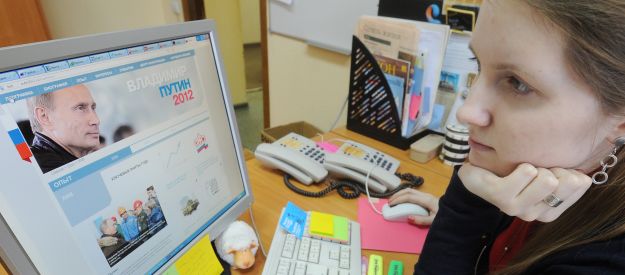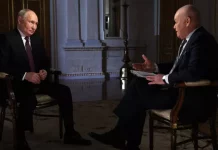
To distract attention from urgent economic problems and the mistakes of Russian authorities, the Russian media are looking for ways to send out alternative messages.
With the deepening economic crisis, Russian media outlets seem to be trying to divert public attention from the country’s acute problems. Some of them use highly clickable headlines conveying very little actual news and serious news pegs to impose an idea that Russia is not the worst place to live regardless of all the economic woes.
For instance, during the last two months, “earth-shattering” reports discussed the Russian President Vladimir Putin’s workout with Prime Minister Dmitry Medvedev, renowned Russian oppositionist Maria Gaidar’s decision to join the team of the governor of Odessa, and the wedding of the Putin’s spokesperson Dmitry Peskov. And all this on the background of urgent topics of the refugee crisis in Europe and the destruction of the sanctioned food products in Russia.
In fact Russian media are making much ado about nothing in the case of easy news or gossips about VIP persons, politicians or celebrities, while shifting focus from serious ones like refugee crisis in Europe (As the independent Slon wrote, some Russian media is increasingly exaggerating the problems with refugees to distract attention from difficulties in Russia and to focus on the West’s failures and weaknesses).
The new opium of the people
Of course, no country has escaped the increased focus on the lives of VIPs and celebrities. But in today’s Russia, such “earth-shattering” news items, as dubbed sarcastically by journalist Mikhail Melnikov, are being artificially churned out into the blogosphere.
“The problem is not so much that Russia is in a difficult situation, but the fact that many of us choose to live under the narcotic smoke of such dazzling newsflashes, which are deliberately leaked online and to the media by both the government and the opposition,” he writes. As a result, Melnikov believes that the Internet has become an El Dorado for windbags and gossips.
Even the president is not immune. The head of state’s “small joys of being” were a daily feature in social networks. One of the main news of this summer has been Putin’s descent in a bathyscaphe to the bottom of the Black Sea offshore Crimea, where he miraculously discovered many ancient amphorae.
For many Russians, it was a case of deja vu. Political analyst Stanislav Belkovsky recalls that it was a repeat of 2011, when Putin plunged to the bottom of the Black Sea offshore Sochi.
“Back then he found one amphora, this time a whole of shipful,” says Belkovsky. “I get the feeling that the ship and the artifacts do not belong to the same period; quite possibly the latter were plundered from Crimean museums.”
U.S.-based PR specialist Dmitry Klimentov notes that unlike Western politicians Putin does not care about how such stories are perceived.
“Putin does what he wants. He likes boyish toys because that’s how he was brought up,” says the expert.
Klimentov also notes that many politicians in the West — as opposed to the Middle East and Latin America — are less inclined towards machismo: “Imagine Angela Merkel in a submarine.”
Most Russian Internet users were amused by Putin’s latest stunt. True, there was also much criticism. The main leitmotif was: “Putin sinks to the bottom as surely as the Russian ruble.”
The fall of the national currency is in fact one of the hottest topics in Russia at the moment. The ruble has hit a low since the start of the year, when it was effectively devalued.
Presidential aide Andrei Belousov warns that, “Russia’s reserves are extremely low, and money to stabilize the exchange rate does not exist. The only way out for the regulator is to raise the key interest rate once again.”
“Economists believe that the Central Bank could avoid many problems if it took the time to explain its actions to the public once in a while. It seems that drastic measures are now in order,” he says.
VEB chief economist Andrei Klepach paints an even gloomier picture. Reduced consumer demand this year has turned out to be even worse than in crisis-hit 1998 and 2009, he said live on-air with RBC. He remarks that the current downturn in the economy is due to falling demand, especially in retail.
“This is a very big shock. It’s more severe than what we went through in 1998 and in 2009,” said Klepach. “Whereas in 2009 household incomes did not fall in real terms, now incomes and wages are indeed falling in real terms.”
But Russian media and bloggers are obscuring the very real challenges faced by Russian citizens who have lost their jobs or suffered wage cuts, while supermarket prices continue to rise. They are given only a cursory mention by state media, if that.
It is perhaps a calculated response to public demand for such distracting information, which carries a strong emotional impact.
In the words of Maxim Trudolyubov, a columnist for business newspaper Vedomosti, “Higher-quality information sources would be like broccoli to a child raised on jam, like a Greek salad to a person hooked on hamburgers, like water to an alcoholic.”
Distractions from reality
Some see such attempts to distract people from real problems through the dissemination of mind-numbing or entertaining information as a tool of state propaganda, which the Russian authorities are adept at wielding.
However, political analyst Dmitry Solonnikov, director of the Institute of Contemporary State Development, asserts that propaganda presupposes the creation of customized content with a vivid ideological tinge. The expert believes that it is folly to label all processes in the media environment, some of which can happen at random, as propaganda.
“There are certain thought patterns and ways of assessing global events, and by no means all come from the Kremlin. ‘Kremlin propaganda’ is like a brand, but a lot of what goes on in today’s information space does not fall into that category,” the expert believes.
According to Solonnikov, “Very many individuals and organizations have their own well-established opinions on a number of contemporary issues. Accordingly, the views they broadcast in the media space often dovetail with what the Kremlin says. Such people and structures are numerous, but they cannot be said to be Kremlin mouthpieces. In this sense, ‘Kremlin propaganda’ as a brand implying a certain ideological direction is largely independent and lives by its own laws.”
Four years ago The Net Delusion: The Dark Side of Internet Freedom by Boston-based Belarussian author Yevgeny Morozov was published in the United States. A Russian-language edition was recently released in Russia.
In it, the author writes that, “The events of the past four years in Russia point to a shift in government policy towards crude measures such as blocking websites. There have also been thinly disguised attempts to seize control of the country’s largest social networks.”
Morozov believes that, “For now the Kremlin is not too worried about its image, and until that changes no one should be surprised by the increasingly frequent methods of direct control it employs.” A common thread that runs through the book is how the government exploits media, social networks and the entertainment industry to distract attention from urgent problems and its own mistakes.
At the same time, Solonnikov’s words about how the traditional Russian way of thinking and the stereotypes entrenched in the Russian mind are largely responsible for turning the Internet into an “illusory” phenomenon, lending itself to easy manipulation, should also be heeded.
For this reason, social networks that create a feeling of “being out-of-control” through the sheer number of pointed comments directed at the authorities can hardly be regarded as a broad democratic platform for exchanging views in a civilized society.
Until such society is formed, and as long as Russia lacks meaningful political opposition and genuinely free media, the trending topics in social networks will continue to be watches on the wrists of Russian officials, and Grecian pottery at the bottom of the Black Sea.
By





